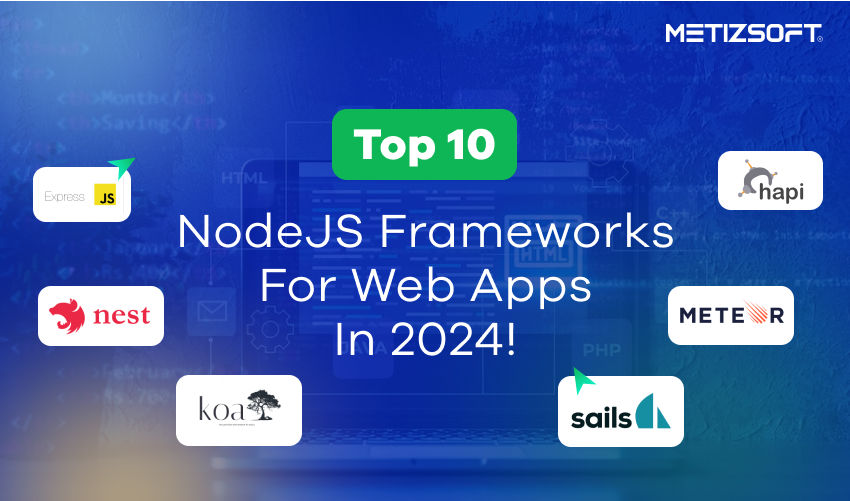
In 2009, Node.js entered the tech stack, enabling developers to use JavaScript for server-side scripting. This framework completed JavaScript client-side scripting, and since then, it has become the most adopted and viable runtime environment for developing reliable and custom web applications.
In this blog post, we’ll categorize the top Node.js frameworks, including their core features, to assist you in selecting the best frameworks for your next project in 2024.
Table of Contents
Understanding NodeJS
Node.js is an exceptional JavaScript runtime environment that is open-source and cross-platform, enabling it to function on multiple platforms such as Windows, Linux, and macOS.
With the advent of Node.js, JavaScript has become an all-in-one solution for server-side scripting and dynamic web page creation. This territory was previously reserved for client-side scripting.
Types of NodeJS Frameworks
There are three types of Node.js web frameworks.
MVC Framework — The Model View Controller (MVC) is an architectural pattern. It is used as a foundation for creating flexible frameworks that allow product owners to develop app layers separately. Specifically, it provides a design pattern that divides app logic into three core components: models, Views, and Controllers. For example, Express.js is built on the MVC architecture.
Full-stack MVC Framework — A full-stack MVC framework is ideal for real-time apps. It offers structural efficiency, libraries, templates, and additional features. It manages both frontend and backend processes and provides app development tools.
Rest API Frameworks — Representational State Transfer (REST) API is crucial for Node.js frameworks. It offers faster development processes and reliable server-client communication routes. Ultimately, it provides an excellent REST API experience. Thereby, freeing product owners from worrying about network app architecture.
Top NodeJS Frameworks to Consider in 2024!
Express.js: Express.js is a widely used web application framework that allows developers to create mobile and desktop applications quickly. Specifically, its focus on scalability and speed makes it a popular choice. Moreover, its lightweight design means it works well with free, accessible modules from the public NPM database.
Core Features of Node.js:
- High performance to enable multiple operations
- Additionally, server-side programming packages can help speed up the development process.
- Moreover, high test coverage for building reliable applications
- “HTTP helpers” furthermore make programs reusable.
- Consequently, content negotiation enables better communication between the client and server.
- Lately, it supports the MVC architectural pattern
Socket.js: Socket.io is a highly acclaimed Node.js framework that enables the creation of real-time computing applications. Consequently, it is widely prevalent among developers for its accuracy, simplifying the entire process. This framework allows developers to build WebSocket applications such as dashboard APIs, chatbots, and ticket scoring. Socket.io is not your typical Node.js framework.
Socket.io Core Features:
- Binary Support
- Support for multiplexing
- Reliability
- Support for auto-reconnect
- Error-detection & auto-correct
- Similar APIs for client & server-side development
Meteor: The Meteor framework is a simple yet powerful full-stack Node.js framework for developing mobile and web applications. Significantly, you can use it across multiple platforms, including Android, iOS, and desktops. Furthermore, Meteor.js provides much support to simplify Node.js development, offering a secure platform for your entire application tier to be written in the same language – JavaScript.
Meteor.js Core Features:
- Consequently, eliminate the need to update mobile applications regularly
- Supports sync catchphrases
- Lightweight
- Only a few lines of code are required
- Ensure seamless and smooth implementation with Vue, React, Angular, Mongo, etc
- The same code for multiple devices
Feather.js: Feather.js is a Node.js REST API framework known for its lightweight structure. It can, furthermore, seamlessly communicate with the backend technology and support various databases.
Furthermore, it can also work with React Native and Angular/React.js frontend technologies. It is one of the top Node.js framework libraries for building applications using REST principles.
Feather.js Core Features:
- Real-time framework
- Streamlines the development of modern Web applications
- Grants access to connect with the required 3rd party services
- It helps to build minimalistic web frameworks
Hapi: As of 2024, Hapi is a highly stable, reliable, and prevalent Node.js framework for building REST APIs. It offers an incredible ability to create servers with unique features, and it is undoubtedly considered the most favorable option among the Node.js frameworks.
Hapi.js Core Features:
- High-end Scalability
- Minimum Overhead
- Secure defaults
- Fast & simple bug-fixing
- Rich community
- Compatible with MySQL, MongoDB, & other databases
- Compatible with HTTPS proxy server & the Rest of the APIs
- Authentication, Caching, & Input Validation
Koa: Koa.js is a small, next-generation web framework for Node.js, developed by Express engineers. Thus, it boasts impressive async abilities, which are essential for building web apps and APIs. Moreover, Koa is streamlined progressively, highly customizable, and has extensive features. Although there’s an ongoing battle between Koa and Express in NodeJS, Koa offers a highly tailored option.
Koa.js Core Features:
- Customizable & futuristic framework
- Furthermore, offers exceptional error-handling
- Additionally, provides a middleware cascade to personalize the user-experience
- Normalises inconsistencies & helps code maintenance
- Also, includes cache cleaning, proxy support, and content negotiation
- Ultimately, it offers customization options
Nest.js: Nest.js is a highly flexible framework for server-side applications. It uses TypeScript and is highly scalable and reliable. Moreover, you will get a unique application architecture through Express.js, making it fast and easy to develop maintainable, highly scalable, and testable applications. Lastly, you will get support for several typing models, including:
- Functional Programming
- Functional Reactive Programming
- Object-Oriented Programming.
Nest.js Core Features:
- Unlocks incredible features with Nest CLI
- Possesses features of Express.js
- Trustworthy
- Additionally, use TypeScript
- Also, provides a modular structure for managing code
- Lately, builds a healthy frontend development on AngularJS
- Developing web applications with unique features that differentiate them from others is beneficial.
Total.js: The speedy Node.js framework needs immediate assistance to provide consistent scaling, incredible performance, and flexible construction of IoT applications. Crucially, it must also deliver stable services without any compromise.
Core Total.js Features:
- Supports databases like MySQL, MongoDB, PostgreSQL, etc
- Quick prototyping
- Highly efficient for project development
- Modular coding structure
- Highly Compatible
- Allows and grants frontend development
- Comprises enormous pre-developed components
- Creates real-time responsive applications
- Community chat
Sails.js Framework: Sails.js is a real-time MVC web development framework built on Express. It effectively enables developers to create data-driven web applications and APIs with ease. Furthermore, Sails.js provides essential blueprints that eliminate the need to write boilerplate code. It also features code generators that help to build applications with less written code.
Sails.js Core Features:
- It showcases high-end compatibility with sites that create frontend platforms
- It helps socket.io
- Hassle-free management of HTTP requests
- It offers ORM (Object Rational Mapping)
- Seamless integration of middleware
- Smooth and secure transactions
- Ensures superior quality
- Help create a simple project template
Loopback: Loopback is a widely used Node.js server framework with a simple CLI and an easy-to-use API website browser. Furthermore, it offers a dynamic API explorer and seamless integration with various REST services, thereby allowing you to build your models based on your schema.
Loopback Core Features:
- Moreover, it helps the developer swiftly generate SDKs
- And then, helps them create seamless API documents
- Smoothly connects with databases
- In fact, it supports a plethora of databases
- Also, it features model-relation-support
- Beyond that, it can run on the cloud
- Connects browsers and devices with data
- Owns a structured code
- Furthermore, it has enhanced documentation for quick development
- Lastly, it offers excellent file management
Pick the Right NodeJS Frameworks for Your Next Project!
We have reached the end of our guide on the best Node.js frameworks for web applications in 2024. However, it’s important to remember that choosing the most reliable and suitable Node.js framework depends entirely on the nature and type of web application you want to develop.
The list of top Node.js frameworks mentioned above can give you an idea of what to use for your project. Node.js offers several benefits, including high scalability performance, dynamic community extensibility, and ease of learning.
If you’re a business owner looking for custom-made solutions for your unique project needs, partnering with a leading Node.js development agency such as Metizsoft Solutions could enable you to use the best Node.js framework for your upcoming project.
AboutChetan Sheladiya
Related Posts
The Things You Probably Didn’t Know You Need to Fix On Your WordPress Website!
So you’re building a new website for your business! Spending day and night with your CMS development company to develop the...
Why Should You Hire AngularJS Developer for Customer-Centric Business?
Gone are the days when companies used to take a product-centric approach to design and developing apps. With consistent and...

